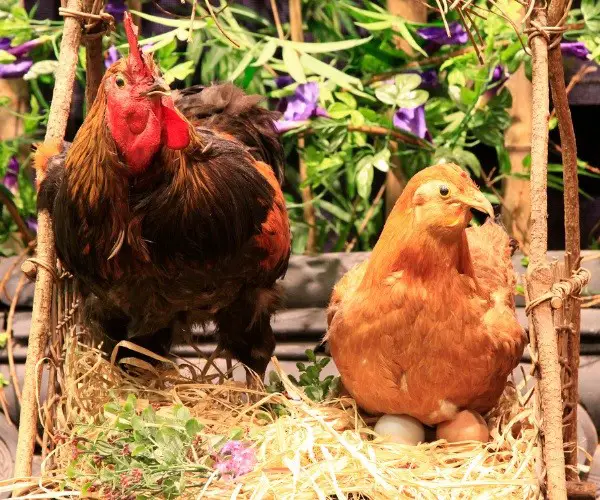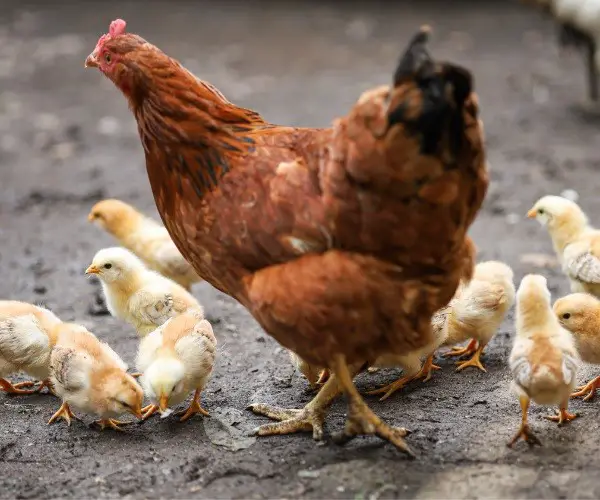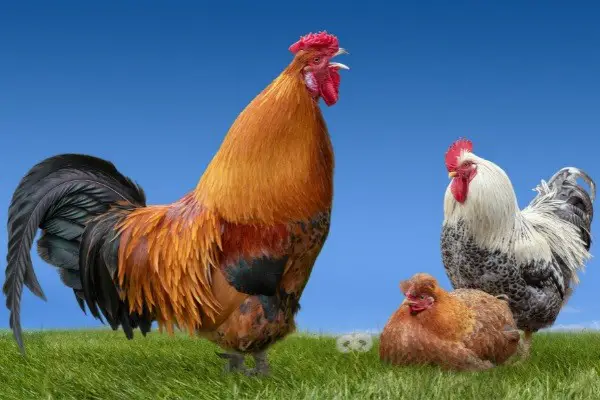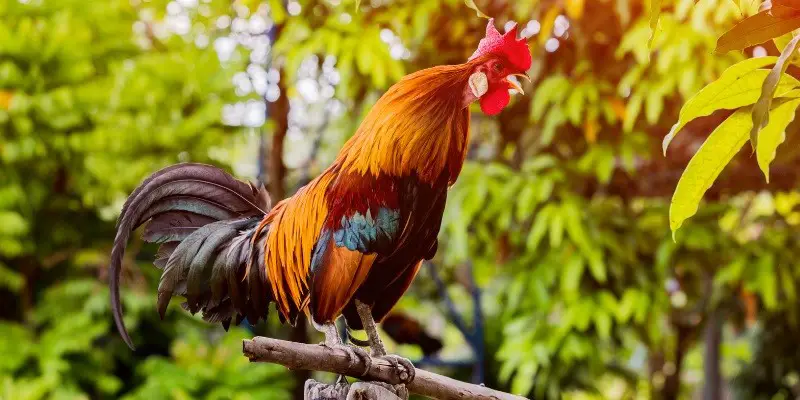You’d be surprised to learn that chickens have a large “vocabulary.” Asides from the usual “cluck cluck” sound, chickens make several other sounds that mean different things.
We have outlined the different sounds that chickens make and what they represent to help you understand your pet better.
Let’s get right down to business, shall we?
What Sound Does a Chicken Make?
Chickens can talk! Now you will ask what sound does a chicken makes?
Well, chickens make different sounds. We have listed a few of these popular chicken sounds and their meanings below.
1. Clucking
Clucking is a familiar sound of the chickens; roosters and hens alike. It occurs very often and can be likened to a discussion sound. We’d like to think your chickens are reliving hot topics when they cluck. This sound also helps them reassure each other that they are safe.
2. Perp-Perping
Usually, roosters use this sound to alert the hens that there is food. Hens also make the perp-peeping sound to alert their chicks that food is available.
If you are observant, you will find that the noise gets more energetic when the chickens find something they truly love like a treat. Expect more of this sound when they find a mealworm, unlike when they’re eating out of their feeder.
3. Alarm or Danger Sound

The rebel yelling is a sound the chicken uses to sound the alarm of predators being around. All the chickens scramble for cover once they hear it.
This sound is more like a repeated shriek that tells the flock that the danger is in the air. Usually, this particular cry is sounded by the rooster when a hawk is sighted.
The other alarm sound is the repetitive clicking that gets faster, louder, and even more persistent in the face of danger. Usually, the attack is from the land like a cat, snake, or fox aiming for the chickens.
Interestingly, your chickens can disregard these alarm cries when the rooster gives them too often for no reason. When this happens, the flock relies on another member to sound the alarm.
4. Mating Song
The rooster makes the mating song to attract the hen. He makes the sound many times during the day and shows that the rooster is ready to mate. Usually, the sound is followed by other mating rituals like the rooster circling the hen, flicking his wings, and chasing off other males.
5. The Egg Laying Song

Yup, chickens have a peculiar sound they make when they are laying eggs. It is loud and sounds like “buk, buk, buk, ba-gawk.” The egg song can get quite loud and perhaps annoying when you have other hens laying their eggs.
The egg song is similar to the sound hens make when their favorite nest box is not available. This sound is aimed at intimidating the intruder and getting her out of the nest box. Yup, chickens can be territorial.
If you notice the territorial behavior getting out of hand, then it is time to add a few more nest boxes to the coop. Usually, the rooster presents these nest boxes to the hen for her approval. Once she settles in, the frantic, agitated “complaint” ceases.
6. Growling or Broody Hen Growls
Hens are generally hormonal when sitting on their eggs. They will hiss and growl at anything they feel is a threat to their eggs. This sound is more like a warning sound; if you ignore the sound, you’ll find yourself on the receiving end of the hen’s sharp beak.
7. Mother and Chick Sound

The mother and chick sound starts long before the chicks are born. It is an efficient mode of communication between the mother hen and her eggs.
She sits on them and chatters with them; this allows them to familiarize themselves with her voice. Towards the final hours, the chicks in the egg start to talk back to the mother hen. Awesome right!
Once hatches, the communication between the mother hen and her chicks continues. All of the chatter helps the chicks learn the language and the meaning behind the different sounds. For example, the mother hen uses low-pitched clucking sounds to warn her chicks of danger and tell them to be still.
8. Coop Noise
If you have chickens, then you probably wonder what all those sounds they make first thing in the morning mean. Simple; the coop noise is your chickens’ way of saying good morning to you. The rooster will crow and the hen will give her sounds.
Coop noise is usually subdued in the evening as the chickens settle in for the night. So yes, kind of like good morning and good night greeting.
9. Roosting Call
At nighttime, your chickens call out to each other. This sound is called the roosting sound, and it tells the flock that it is time to get into the coop. The call is similar across the sexes; loud and repetitive. Some rooster breeds walk around the chicken coop in circles until the last of the hen is safe inside.
10. Crowing

Usually, it is the rooster that grows, but on special occasions, hens too can crow. The alpha rooster crows at the wee hours of the day to alert the others that it is time to get up and hunt for food. Once the leader rooster has crowed, the others follow suit and let out their cries in order of their dominance.
11. Happy Murmuring
This is the best chicken sound; it means your chickens are content, safe and happy. The soft murmurs or chatters are their way of communicating with each other while they forage the yard or chill in the sand.
Chickens groomed as pets also make this sound when you stroke or groom them. It is a sign that you are doing something right!
Conclusion
When you sit with your chickens, you will hear different sounds. Some are warning sounds, other roosting calls, and yet others, mating calls. Learn the sounds chickens make and their meanings in this article.
Last Updated on November 1, 2023 by Pauline G. Carter

